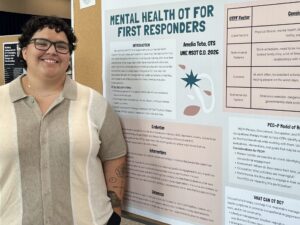
Parenting a teenager comes with its own set of challenges, but when your teen is struggling with both anxiety and Attention Deficit Hyperactivity Disorder (ADHD), the journey can feel especially daunting. As therapists, educators, and caregivers, it’s essential to understand the unique intersection of anxiety and ADHD in teenagers and how to provide effective support.
Anxiety and ADHD often coexist in teenagers, creating a complex interplay of symptoms that can significantly impact their daily lives. ADHD is characterized by difficulties in attention, hyperactivity, and impulsivity, while anxiety manifests as excessive worry, fear, apprehension, and avoidance. When these conditions intersect, they can exacerbate each other, leading to heightened stress levels, decreased functioning, and an increased risk of academic, social, and emotional difficulties.
Parents and therapists should be vigilant in recognizing the signs of anxiety and ADHD in teenagers. Symptoms of ADHD may include difficulty concentrating, impulsivity, forgetfulness, disorganization, and restlessness. On the other hand, anxiety symptoms may manifest as excessive worrying, perfectionism, avoidance of social situations, somatic symptoms such as stomachaches or headaches, and difficulty sleeping.
Effective support for teenagers with ADHD and anxiety requires a collaborative approach involving parents, therapists, educators, and other supporting professionals. Collaborate on developing a comprehensive treatment plan that addresses both ADHD and anxiety symptoms, taking into account the teenager’s individual needs and preferences.
Empower teenagers to become active participants in their treatment journey. Educate them about ADHD and anxiety, helping them understand how these conditions affect their thoughts, feelings, and behaviors. Teach practical coping skills for managing stress and anxiety, such as deep breathing exercises, mindfulness techniques, and time-management strategies. Encourage teenagers to advocate for themselves and communicate their needs effectively.
Establishing Structure and Routine
Consistent structure and routine are crucial for teenagers with ADHD. Help them create a daily schedule that includes time for homework, relaxation, exercise, and social activities. Break tasks down into manageable steps and provide clear expectations to reduce overwhelm and improve focus.
Encouraging Self-Care
Encourage teenagers to prioritize self-care activities that promote physical, emotional, and mental well-being. This may include regular exercise, adequate sleep, healthy eating habits, and engaging in hobbies or activities they enjoy. Model healthy coping strategies by practicing self-care yourself and prioritizing your own well-being.
Seeking Professional Support
Encourage teenagers to seek professional support from therapists, counselors, or psychiatrists specializing in ADHD and anxiety. Therapy, such as cognitive-behavioral therapy (CBT) and exposure and response prevention (ERP), can be highly beneficial in helping teenagers develop coping skills, challenge negative thought patterns, and reduce anxiety symptoms. Medication may also be prescribed in some cases to alleviate symptoms of ADHD or anxiety.
Fostering Open Communication
Create a supportive environment at home where teenagers feel comfortable expressing their thoughts, feelings, and concerns. Foster open communication and active listening, validating their experiences and providing reassurance during times of distress. Encourage teenagers to share their successes and setbacks, celebrating their achievements no matter how small.
Remembering Patience and Compassion
Above all, remember to approach the journey with patience, compassion, and empathy. Supporting a teenager with ADHD and anxiety can be challenging, but with understanding, support, and guidance, they can learn to navigate their challenges and thrive. Celebrate their strengths, celebrate their progress, and remind them that they are not alone on this journey.
Supporting teenagers with ADHD and anxiety requires a multifaceted approach that addresses their unique needs and challenges. By working collaboratively, empowering teenagers, establishing structure and routine, encouraging self-care, seeking professional support, fostering open communication, and practicing patience and compassion, parents and therapists can provide effective support and help teenagers reach their full potential. Together, we can navigate the journey and empower teenagers to overcome obstacles and embrace their strengths.


